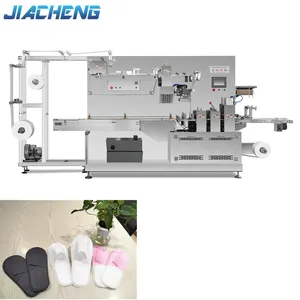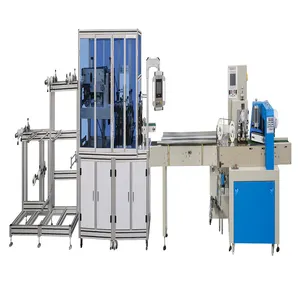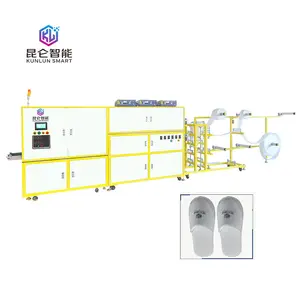(2383 products available)





























































































































































































































Disposable slippers machines are automated devices that manufacture disposable slippers or flip-flops. They come with different functionalities and can produce a variety of disposable slippers.
Pellet to Product Machines:
These machines are notable for producing disposable slippers from raw materials like EVA or PE pellets. The primary production process begins with feeding the pellets into the machine. The pellets are heated until they melt and form a uniform sheet. The sheet is cut into individual slippers by using molds within the machine. In most cases, they are used for large-scale production of disposable slippers in places like hospitals, spas, and hotels for guests to use.
Die-Cutting Machines:
These machines are more straightforward and are designed to produce disposable slippers from pre-made plastic sheets. The plastic sheets are fed into the machine, and the die-cutter cuts them into specific slipper shapes. They are suitable for businesses that aim to produce a certain kind of disposable slipper and want to customize the slippers.
Fully Automated Production Lines:
These complex systems integrate various production stages, including feeding materials, heating, molding, trimming, hole punching, assembling, and packaging. Such machines are the ideal choice when looking to produce large quantities of disposable slippers within a short period.
When purchasing a disposable slipper machine, one should look for critical features such as production capacity, size, ease of use, material compatibility, design options, energy efficiency, and any safety standards compliance. It's also helpful to compare different brands and models, read reviews, and ask for recommendations from others in the industry before making a decision.
The specifications of a machine for making disposable slippers may vary from model to model. Here are some parts and their general specifications along with the maintenance requirements:
Hotels and resorts
Due to their warm ambiance and commitment to delivering outstanding customer care, luxury hotels, spas, and resorts are constant suppliers of disposable slippers. Disposable slippers offer hotel visitors a level of convenience, ease, and hygiene that is unparalleled. This is especially true when it comes to modern-era hotels with dedicated facilities like swimming pools, spas, and beaches, where sandals are nonetheless required but not allowed (because of hygiene concerns, which is a valid criterion).
Airlines and travel
When passengers fly First Class or Business Class, they receive complimentary amenities like cozy flip-flops made of nonwoven fabric that are useful for both in-flight and layovers at the airport.
Healthcare facilities
Another venue where disposable slippers are mandatory and should be worn at all times is the hospital floor. When they undergo treatment or diagnostic tests, patients must wear slippers that are non-slip and comfortable. Because they are easy to disinfect and can minimize the spread of dirt and germs from the outside, they might be a suitable option for patients receiving care in hospitals.
Fitness centers and spas
Another possible option that disposable slippers could offer is a personalized, luxurious experience; thus, fitness centers might become preferable over traditional centers, which have always been the choice for spa centers.
Events and conferences
At large gatherings like festivals, outdoor activities, sports competitions, trade exhibitions, or other important events, organizing committees might have many options to provide comfort to participants, visitors, and athletes. It is not a bad idea for omnipresent event organizers to consider incorporating disposable slippers into the welcome set and a pair of slippers for each athlete, especially for those who come from overseas.
When it comes to purchasing a disposable shoe covering machine, a few factors must be considered before making a sensible investment. First and foremost, people must determine the kind of fabric they want to utilize for their disposable slippers—for example, PVC fabric, PP non-woven fabric, or TPU fabric. The selection is mostly affected by the end-user requirements.
Secondly, people can choose manual slipper-making machines or automated machines with advanced features like photoelectric control, automatic counting, automatic feeding, and more, depending on their production capacity. People should analyze their manufacturing capacity before selecting any specific kind of slipper-making machine. Remember, automation enhances efficiency and reduces labor demands.
Thirdly, the design parameters included in a particular type of disposable slipper-making machine will affect the final product. People can choose to get printed or plain slippers; however, with different kinds of machines, the customization options are limited. Hence, choose a machine that will make a product that can be customized according to the end-user's needs.
Fourth, the quality of the finished product also depends on the quality of the slipper-making machine. It is essential to consider the quality of the slipper machine to ensure that the end product meets the market standards. Look for suppliers who provide durable and long-lasting machines.
Q: How does a disposable shoe cover machine work?
A: A shoe cover machine uses rolls of PP/PE, which is effectively pulled and formed into a boot cover shape with heat and air that is then used to assist in covering the feet and is elastically kept snug around the ankle.
Q: What are some benefits of using a disposable slippers machine?
A: The advantages include reduced laundry expenses, consistent product quality, time-saving, enhanced guest experience, improved hygiene, bulk production, customization, and efficient supply chain integration.
Q: Can a disposable slippers machine be upgraded as technology improves?
A: Yes, many modern machines have modular designs that allow upgrades and customization according to market trends.
Q: What is the production speed of a disposable slippers machine?
A: Depending on the model and specifications, the production speed can range from 100 to 500 pairs per hour.